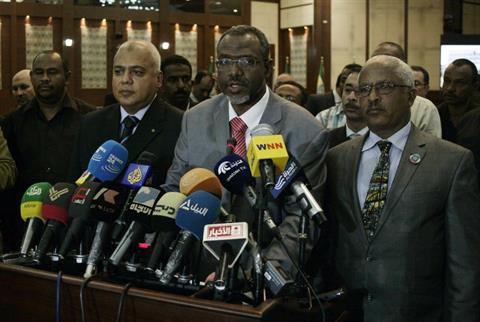 Khartoum — Water ministers of Sudan, Ethiopia and Egypt failed to reach an agreement on the disputed Ethiopian Renaissance Dam project and decided to refer the sticking points to a third meeting.
Khartoum — Water ministers of Sudan, Ethiopia and Egypt failed to reach an agreement on the disputed Ethiopian Renaissance Dam project and decided to refer the sticking points to a third meeting.
The second ministerial meeting which was held in Khartoum on Monday sought to reach an agreement on forming a joint mechanism for implementing the recommendations of the International Panel of Experts (IPoE) regarding the dam.
The IPoE is composed of six representatives each drawn from Ethiopia, Egypt and Sudan, and another four international experts and was established to assess the impact of the dam project on downstream countries.
The report which was submitted by IPoE to the three countries last June is believed to show that the $4.7 billion dam will not have any major effect on lower riparian countries of Egypt and Sudan. However Egypt assert that the deficiencies mentioned by the report need to be addressed before carrying on with the dam project.
The Sudanese water minister, Muattaz Musa Abdallah Salim, told reporters following the meeting that they have addressed a significant part of the issues on the follow-up of the implementation of the IPoE recommendations.
He added that they concluded the second meeting successfully, pointing that remaining issues would be addressed in Khartoum during talks which will be held from January 4 to 5.
The Egyptian water minister, Mohamed Abdel-Mutalab, for his part told reporters that they reached an agreement on some items but others are still pending.
Sources close to the meeting said that Egypt and Ethiopia presented two papers on the points of contention, while Sudan's paper attempted to reconcile the two positions.
The same sources said that Egypt wanted international representatives on the committee but Ethiopia preferred national delegates.
The Sudanese daily newspaper Al-Ray Alaam quoted sources on Tuesday as saying the Egyptian delegation suggested that Ethiopia should only complete the first phase of the dam to store 14.5 billion cubic meters to produce 1200 MW of hydroelectric power to meet its energy needs.
The member of the Egyptian delegation, Alaa Al-Zawahri, earlier said that Egypt would suggest during the meeting that Ethiopia build a smaller dam and suspends the ongoing construction for six months until the completion of the studies.
He described in an interview with the Egyptian CBC TV the Sudanese stance with regard to the dam as "puzzling", pointing that Sudan turned from a strategic partner of Egypt into a biased mediator.
Egypt demanded Ethiopia to agree with it and Sudan on the dam's operating and storage rules through a technical mechanism formed by the three countries besides implementing the necessary projects to avoid the negative effects of the dam.
When the dam project, which will have power generation capacity of 6,000 MW, goes operational, it will generate up to 2 million Euros per day from exporting hydro-electricity.
Egypt believes its "historic rights" to the Nile are guaranteed by two treaties from 1929 and 1959 which allow it 87 percent of the Nile's flow and give it veto power over upstream projects.
But a new deal signed in 2010 by other Nile Basin countries, including Ethiopia, allows them to work on river projects without Cairo's prior agreement.
Both Sudan and Egypt have not signed the new Nile Basin deal.
Sudan also relies on Nile resources but has said it does not expect to be affected by the dam.
On Wednesday Sudan and Ethiopia inaugurated a cross-border electricity linkage. Media in Khartoum said Sudan will initially buy 100 MW from Ethiopia through the 321-kilometre (199-mile) line.
Source: SudanTribune
No comments:
Post a Comment